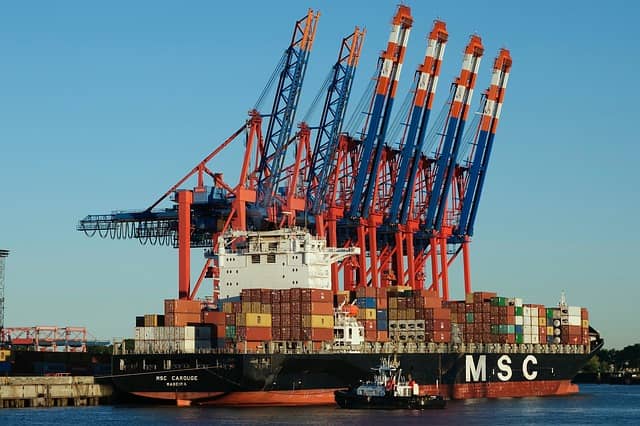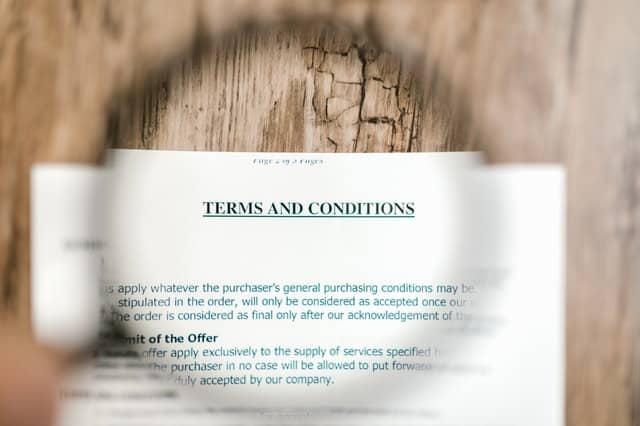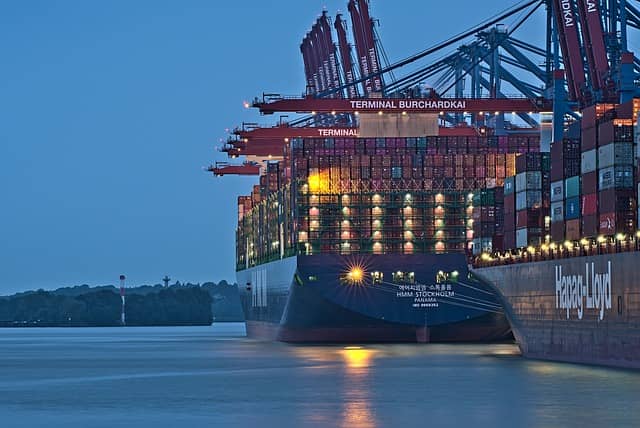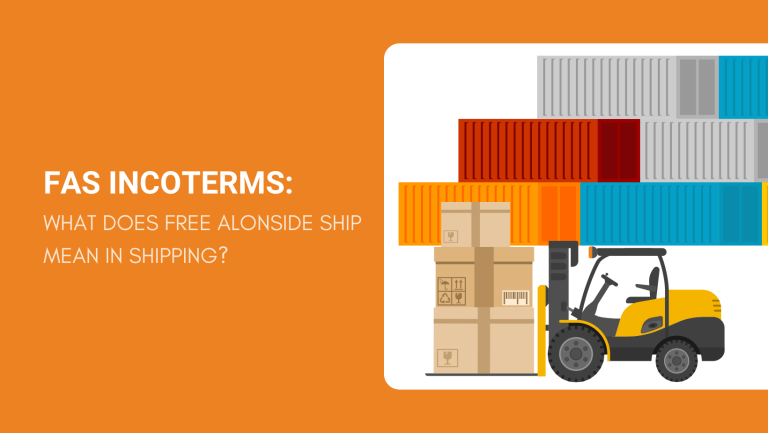The import and export business is booming day by day. With all the processes of demands and subsequent supplies, international trade does not seem to go slow anytime soon.
As buyers and sellers both share responsibilities in international import and export processes, there had to be predefined responsibilities for both parties.
That is exactly why Incoterms had to be introduced. FAS Incoterms is one of these international trade agreements. In this article, you will know everything about what the FAS contract is and what these Incoterms are all about.
Let’s start.
What Does FAS Stand For?
FAS stands for “Free Alongside Ship”. This is an acronym that specifies the seller’s responsibilities to deliver the items alongside the ship at the port nominated by the buyer.
We will discuss it in detail in the coming sections of this article.
The Meaning of Free Alongside Ship in International Shipping
The shipping industry has special terms and conditions. Some of the most common shipping terms especially in international transportation are mentioned below.
- Pre-carriage
- Port
- Terminal
- Vessel
- Ship
- Main Carriage
- Onward Carriage
Currently, we are discussing the “Free Alongside Ship” terminology. These are the trade terms that refer to the point at the port just before the main carriage where the goods are loaded alongside the vessel.

What Does FAS Shipping Contract Mean for Seller and Buyer?
The loading alongside the vessel is the last point where the seller is required to deliver the products. The buyer bears all the responsibilities from that point onwards until the goods reach the final destination.
To make ourselves clear about every step of shipping in FAS agreements, let us discuss them in detail and try to understand the true essence of FAS Incoterms.
What Are FAS Incoterms?
The Incoterms is short for “International Commercial Terms”. These are the terms and conditions that are defined by the International Chamber of Commerce (ICC).

These terms and conditions help award clear responsibilities to the buyers and sellers who sign a specific international shipping agreement.
There are a total of eleven Incoterms for this purpose. These Incoterms are updated from time to time. The latest Incoterms are called ICC Incoterms 2020. FAS Incoterms is one of these agreements.
The FAS Incoterms define the responsibilities, obligations, costs, and risks that a seller and a buyer have to bear in this contract.
Let us discuss them one by one below.
The Responsibilities in FAS Incoterms
Following are the roles and responsibilities of sellers and buyers in FAS Incoterms.
Seller’s Responsibilities in FAS Incoterms
The seller is responsible to do the following tasks according to the international rules of the FAS contract.
- Arrangement of goods or products as ordered by the buyer.
- Make sure to meet all the product requirements according to the specifications shared by the buyer.
- Sharing the bill or an invoice for the payment of the goods ordered by the buyer.
- Doing all the formal documentation so that it may be shared with the buyer or with any other official for doing the formalities.
- Packing the products properly so that they are acceptable at the port of origin and the port of destination.
- Marking the products to make them eligible for export and import formalities.
- Arranging and providing the relevant licenses to show at the port the products qualify for export purposes.
- Providing other documentation to be shared with customs officials at the port of origin.
- Arranging the carriage to pick the products from the seller’s warehouse and to deliver them to the terminal of the origin country.
- Delivering the products from the terminal to the point of alongside ship or vessel at the named port of origin country.
- Clearing the goods in pre-shipment inspection at the port of origin country.
- Providing the proof of delivery to the buyer so that he can take over from that point onwards.
Buyer’s Responsibilities in FAS Incoterms
The buyers assume all the shipping responsibilities right from the point where the seller delivers the products alongside the ship. The rest of the shipping steps are the buyer’s responsibilities.
These responsibilities include the following.
- Payment to the seller as per the bill or invoice shared by the buyer. This is the payment for purchasing the ordered products.
- Getting the products loaded to the ship for the main carriage.
- The arrangement of the main carriage to make the products ready for export.
- Receiving the products at the port of the destination country.
- Unloading the products at the destination port.
- Import clearance from customs along with paying for all the duties.
- Clearing the goods from pre-shipment inspection in the destination port.
- The arrangement of freight or cargo for taking the products from port to the final destination.
So, you can say that the buyer has somewhat more responsibilities as compared to sellers in FAS Incoterms. The seller’s responsibilities end in his own country right after delivering the products alongside the vessel.
Main Challenges for Buyers in FAS Incoterms
The potentially difficult challenge for the buyers in FAS Incoterms is doing their part in the source or origin country.
The following two tasks might be difficult for you as a seller especially if you are new to the import and export business.
- The process of getting your products loaded onto the main carriage.
- The arrangement of the main carriage at the port of origin.
As these two tasks may require your virtual or physical presence in the country of origin, these tasks may pose a challenge to the buyer.
The Costs for Buyers and Sellers in FAS Incoterms
Let us discuss the costs of shipping steps that a seller and a buyer have to bear according to FAS shipping Incoterms.

The Costs for Sellers in FAS
The seller has to bear the following costs in the FAS shipping contract.
- The costs of arranging the freight and cargo to move the products from the seller’s warehouse or a manufacturing location to the new port.
- The costs of packing and marking the products as per the export guidelines.
- The customs charges and export duties as determined at the time of export.
- The charges of pre-shipment inspection at the port of origin.
The Costs for Buyers in FAS Incoterms
The buyer is responsible for paying for the following shipping steps in the FAS shipping agreement.
- The main payment for purchasing the goods from the seller is as per the seller’s invoice or commercial bill.
- The costs to load the products onto the vessel or ship to make them ready for the main carriage.
- The costs for the main carriage to initiate the export process in the country of origin.
- The costs of unloading the goods at the receiving port.
- The costs of pre-shipment inspection at the port of origin.
The above-mentioned costs are in addition to any unexpected costs that may come as a surprise such as shipment rejections at the port, etc.
The Risks for Sellers and Buyers in FAS Incoterms
Every shipping agreement puts some amount of risks on the sellers and buyers.

The risks for buyers and sellers in FAS shipping contracts are discussed below.
The Risks for Sellers in FAS
The seller may have to face the following risks in FAS agreements.
- The risk of damages during the loading of goods at the seller’s warehouse.
- The risk of loss while transporting goods from the seller’s warehouse to the port of origin.
- The risks involved in clearing the goods at the customs at the port of origin before they are ready for export.
- The risks of product rejections due to any reason identified during the pre-shipment inspection.
- The risks involved during the unloading of goods alongside the ship.
The Risks for Buyers in FAS
The buyers are prone to facing a little higher risks as compared to the sellers in FAS agreements. They are mentioned below.
- The main risk for the buyer in FAS agreements is the timely presence of the vessel on the port. If the seller delivers goods on the communicated time and the vessel is not there, then the buyer has to bear this loss.
- The risks involved in getting the products loaded for the main carriage. The products can get damaged if the loading is done in an unprofessional way.
- The risks of shipment delays during the main carriage. The buyers also have to face the circumstances due to any natural reasons of delays or losses during the main carriage.
- The risks of customs delays during the customs clearance processes at the port of destination.
- The risks of customs rejections and additional duties at the port of destination.
- The risks of products falling under import restrictions.
- The risks of damages during the unloading of products at the port.
- Unavailability or the sudden price hikes in local freight for onward carriage.
- The chances of products losses and damages during the onward carriage.
- The risks that are associated with the final unloading of goods at the buyer’s location.
While it is quite possible that everything goes well for both parties but still, we need to have the risks in our minds.
So, you can observe that the buyer may have to face a higher amount of risks in comparison to the seller in FAS shipping contracts.
Pros and Cons of FAS Incoterms
Every Incoterms has its pros and cons for the buyers and sellers. Let’s discuss the benefits and drawbacks of FAS Incoterms for the sellers and buyers individually.

Pros of FAS Incoterms for Sellers
Following are the benefits for sellers who sign the FAS agreement.
- The sellers are only responsible for the tasks or shipping steps to be performed in their own country.
- The seller has the benefit of utilizing his network of freight and cargo for the delivery of goods from his warehouse to the port.
- The seller does not have to arrange the main carriage which is one of the points of concern in any shipping agreement.
- Due to the lower number of seller’s responsibilities, a seller can focus on bringing more shipping contracts to increase his business.
Cons of FAS Incoterms for Sellers
Following are the disadvantages for the sellers who sign the FAS shipping contract.
- Low responsibilities and risks would mean low-profit margins for the sellers in the overall FAS shipping deal as compared to other shipping contracts that involve the sellers to do the most shipping steps.
- Less control over the shipping steps.
Pros of FAS Incoterms for Buyers
The buyer also encounters some advantages and disadvantages in FAS agreements. Let’s discuss them in the section below.
- A greater number of steps means higher control over the shipping process.
- The buyer can expedite or slow down the shipping process as per his wishes and requirements.
- More responsibilities of shipping steps translate into more cost savings for the buyers. The buyers can slash the seller’s margins by taking more control over the shipping steps.
- Chances for broader shipping experience in the source country, especially with the main carriage.
Cons of FAS for Buyers
You may have to face some disadvantages for the FAS agreement. They are highlighted below.
- It can be difficult for the buyers to take control of the shipment at the port of origin.
- Lesser visibility and control over the shipping steps controlled by the seller, especially the export formalities.
- The buyer may have to bear shipment delays during the main carriage.
- More responsibilities mean more risks for the buyers.
Who Should Select the FAS Shipping Agreement?
With all the different types of shipping agreements and their relevant Incoterms, it might be confusing for some buyers to select the agreement that best suits their needs.
Therefore, we are discussing who should go for the FAS shipping agreement in the section below. If you consider that you are the kind of buyer who falls under all of the following points, you should go for the FAS agreement.
- You have yourself dealt in FAS agreements before yourself or have partnered with someone who has dealt in FAS agreements.
- If you have experience in arranging the ocean freight or the main carriage via sea in the source country.
- You have arranged the vessel on the port of the origin country or you know the complete process of how to arrange it on time.
- You are completely aware of the import rules and customs formalities in your country.

- You have complete knowledge of all the charges starting from the main carriage to import duties, import customs clearance charges, unloading, and onward carriage charges.
- You know how to get the products unloaded at the port.
- You have a good network of freight in your own country for the onward carriage.
If the above-mentioned points match with your experience or expertise, consider the FAS agreement as a green signal for your next import.
Tips to Use FAS Incoterms in Your Favor
Consider the following tips to turn the FAS shipping agreement profitable for you.
- Carry out a detailed cost analysis of all the possible ways to import your required products from another country.
- Try asking for quotes from a product sourcing agent.
- Compare the costs, risks, and obligations with other shipping Incoterms that are near to FAS Incoterms. Try making import feasibility with FOB and CFR Incoterms.
- Negotiate with the seller about the prices by showing him the cost comparisons you made.
- Have your agent in the source country who can help you with things related to that country.
- You can also ask the seller to provide additional service including the main carriage but this must be mentioned in the contract.
- Have a good knowledge and network in your country regarding customs clearance, unloading, onward carriage, etc.
FAQs about FAS Incoterms
We have answered the frequently asked questions on the topic to further clarify what these Incoterms are all about.
Read the answers below to eliminate any confusion on this shipping contract.
What Are the Acceptable Modes of Transportation in FAS Incoterms?
The acceptable mode of transportation for FAS Incoterms is via sea or ocean freight only. These Incoterms are also applicable to the inland waterways.

The reason for this is quite clear.
As the responsibilities of the seller require him to deliver the products alongside the ship, these Incoterms will not apply to any other mode of transportation where there is no involvement of a ship.
So, these Incoterms will not apply to other forms of transportation including air, road, and rail transportation, etc.
Who Is Responsible for Insurance in FAS Incoterms?
FAS Incoterms do not put any obligation on the seller or bigger to have the insurance of goods. The point of insurance must be agreed upon between the sellers and buyers while signing the contract.

According to the Incoterms 2020, the International Chamber of Commerce (ICC) has not made the insurance necessary for FAS agreements.
If insurance is important to you, you can go for CIF (Cost, Insurance, and Freight) Incoterms in case of sea transporter or CIP (Cost and Insurance Paid to) Incoterms for the shipments having various modes of transport.
You can still ask for insurance while signing the FAS contract by asking the seller to insure the goods. You need to bear the insurance charges if you decide to do so.
Can the FAS Incoterms Be Used for Containerized Goods?
No. The FAS Incoterms are not used for containerized goods. That is because the seller has to deliver the goods alongside the ship rather than delivering the container to the dry port.
The FAS contracts are suitable for bulk cargoes that are not containerized.
Final Words
Incoterms rules are made to clear the confusion. We have discussed almost everything in this article regarding FAS Incoterms.
We also discussed responsibilities, risks, and costs for both parties in FAS agreements. Don’t forget to revisit the tips that we shared if you decide to choose the FAS shipping agreement.
Do you want to source products from China at affordable costs? We are always there to help you. Ask for a free quote today and we will make your import worthwhile.

